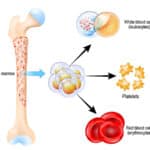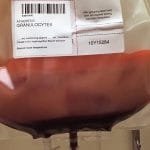Your hospital’s blood management program may be perfect, but too late! Preoperative anemia treatment might be the “missing link.”

Dr. Aryeh Shander
BBGuy and SABM
This episode is the second in my “friendly collaboration” with the Society for the Advancement of Blood Management. I am very grateful to Dr. Carolyn Burns from SABM for helping to arrange this interview. SABM is helping chart the course toward more effective PBM strategies, and I highly recommend you check out their resources and web site.

Dr. Aryeh Shander
BBGuy and SABM
This episode is the second in my “friendly collaboration” with the Society for the Advancement of Blood Management. I am very grateful to Dr. Carolyn Burns from SABM for helping to arrange this interview. SABM is helping chart the course toward more effective PBM strategies, and I highly recommend you check out their resources and web site.
The real question is whether a transfusion was “AVOIDABLE.”
About My Guest:
Aryeh Shander, M.D., FCCM, FCCP, is the Emeritus Chair, Department of Anesthesiology, Critical Care Medicine, Pain Management and Hyperbaric Medicine at Englewood Hospital and Medical Center in Englewood, NJ. He is an Adjunct Clinical Professor of Anesthesiology, Medicine, and Surgery at Icahn School of Medicine at Mount Sinai in New York City and Clinical Professor of Anesthesiology at Rutgers Medical School. Dr. Shander is the Executive Medical Director of The Institute for Patient Blood Management and Bloodless Medicine and Surgery at Englewood Hospital.
Dr. Shander lectures nationally and internationally on a variety of topics. His publications have appeared in numerous prestigious peer-reviewed medical journals. He is the author/editor of multiple book chapters and a contributor to numerous textbooks on blood management.
He is Past President of the Society for the Advancement of Blood Management (SABM) and is a Fellow of the American College of Critical Care Medicine and the American College of Chest Physicians. Dr. Shander is a founding member of the Board of Directors and was a Past President for National Anemia Action Council (NAAC). In 1997 Dr. Shander was recognized by Time magazine as one of America’s “Heroes of Medicine.” In 2018, Dr. Shander was the recipient of the International PBM Implementation Award from the Patient Blood Management European Network.
Dr. Shander received his medical degree from the University Of Vermont College Of Medicine and completed an internship and residency in Internal Medicine at Montefiore Medical Center in Bronx, New York, where he also served as Chief Resident. Additional postgraduate training included a fellowship in Critical Care Medicine and a residency in Anesthesiology, both at Montefiore Medical Center. Dr. Shander is board-certified in Internal Medicine, Critical Care, Anesthesiology and Hyperbaric Medicine.
DISCLAIMER: The opinions expressed on this episode are those of my guest and I alone, and do not reflect those of the organizations with which either of us is affiliated. Neither Dr. Shander nor I have any relevant financial disclosures.
Further Reading:
- Article by Dr. Shander on preoperative anemia: Shander A. Preoperative anemia and its management. Transf Apher Sci 2014;50:13–15.
- True cost of transfusion: Shander A et al. Activity-based costs of blood transfusions in surgical patients at four hospitals. Transfusion 2010;50:753-765.
- Article by Dr. Shander et al on ESAs: Shander A et al. Erythropoiesis‐stimulating agents: friends or foes? Transfusion 2013;53:1867-1872
- Article outlining barriers to pre-op anemia optimization: Munoz M et al. ‘Fit to fly’: Overcoming barriers to preoperative haemoglobin optimization in surgical patients. Brit J Anaesth 2015;115(1):15–24.
- International consensus statement on pre-operative anemia management: Munoz M et al. International consensus statement on the peri-operative management of anaemia and iron deficiency. Anaesthesia 2017;72:233–247.
- NATA guidelines for preoperative anemia in orthopedic patients (includes awesome flow chart!): Goodnough LT et al. Detection, evaluation, and management of preoperative anaemia in the elective orthopaedic surgical patient: NATA guidelines. Brit J Anaesth 2011;106(1):13–22.
- SABM Paper on Pre-op Anemia: Anemia in the Pre-surgical Patient: Recognition, Diagnosis, and Management. SABM 2014
- Paper showing preop anemia is an independent risk factor for perioperative and postoperative complications: Seicean S et al. Preoperative Anemia and Perioperative Outcomes in Patients who Undergo Elective Spine Surgery. Spine 2013;38(15):1331–1341.
Music Credit
Music for this episode is by Mar Virtual via the Free Music Archive. Click the image below for permissions and license details.














Thank you for creating this platform! This particular podcast was just incredible! The wealth of knowledge that one can learn from you and Dr. Shander in one podcast would possibly encompass weeks or in a regular classroom setting. I would love to hear more about Bloodless Stem Cell Transplants (since these patents sustain crazy low blood counts). Recently read a research article by Patricia Ford about her success in this arena. Would you be able to look into the success in this area of medical practice in future podcasts? Best Regards, P C
I’m really happy and honored that you liked it, Patricia! I’m not sure that bloodless stem cell transplants is something that would be right for my audience, but I’ll take a look. Thanks very much for the kind words.
-Joe
Sorry about this delayed response! Your podcast is such an incredible source of informationabout all things dealing with blood! Thank you for all your hard work. It looks like the US military wants its doctors to learn about patient blood management due to the obvious lack of blood in war zones and on the battlefield. Looks like the department of defense thinks that it would also be helpful in trauma situations and after a natural
disaster strikes when blood isn’t readily available. I believe the hospital that Aryeh Shander is affiliated is in the forefront of this endeavor. Incredibly fascinating.